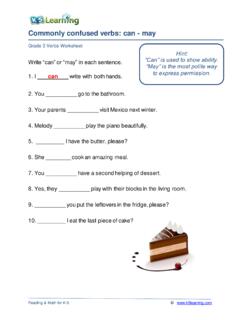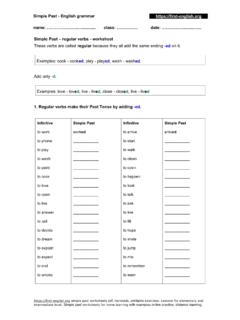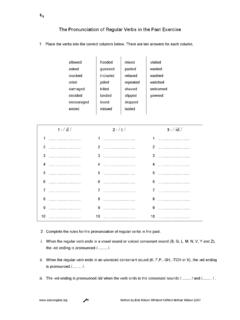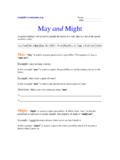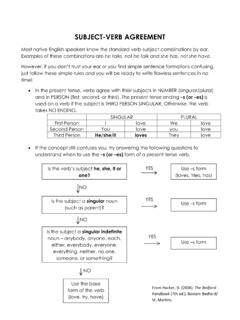Verbs Worksheet
Found 5 free book(s)Commonly confused verbs: can-may worksheet - K5 …
www.k5learning.comCommonly confused verbs: can-may worksheet Author: K5 Learning Subject: Grade 3 Verbs Worksheet: Commonly confused verbs: can-may Keywords: verbs, can, may, grammar, grade 3, worksheet, english Created Date: 3/26/2019 7:36:33 AM
Simple Past - English grammar https://first-english.org ...
first-english.orgSimple Past – regular verbs - worksheet These verbs are called regular because they all add the same ending -ed on it. Examples: cook - cooked, play - played, wash - washed, Add only -d. Examples: love - loved, live - lived, close - closed, live - lived 1. Regular verbs make their Past Tense by adding -ed. Infinitive to work to phone to play ...
The Pronunciation of Regular Verbs in the Past Exercise
www.autoenglish.org1 Place the verbs into the correct columns below. There are ten answers for each column. 2 Complete the rules for the pronunciation of regular verbs in the past. i. When the regular verb ends in a vowel sound or v oiced consonant sound (B, G, L, M, N, V, Y and Z),
Modal Auxiliary Verbs - EnglishForEveryone.org
englishforeveryone.orgTitle: Microsoft Word - Auxiliary modal verbs - May and Might.doc Author: rewind Created Date: 10/1/2008 12:28:30 PM
SUBJECT-VERB AGREEMENT - Menlo College
www.menlo.eduIn the present tense, verbs agree with their subjects in NUMBER (singular/plural) and in PERSON (first, second, or third). The present tense ending –s (or –es) is used on a verb if the subject is THIRD PERSON SINGULAR. Otherwise, the verb takes NO ENDING. SINGULAR PLURAL First Person I love We love Second Person You love you love
